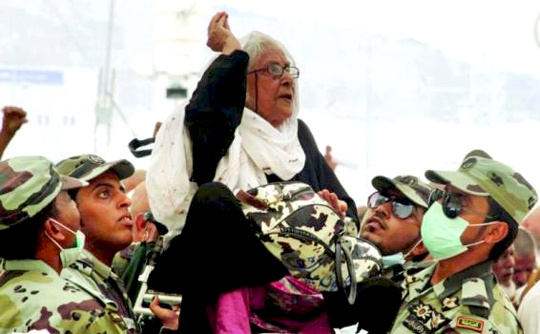Mina, Oct 6: Haj has never been so organized — from the trains that run on elevated tracks to the extremely helpful security forces on the ground and in the many helicopters that hover overhead informing the central operations command about possible bottlenecks.
Saudi Arabia has poured billions of riyals into infrastructure here at the holy sites. Most of these gigantic projects have been carried out in the last five years. They have helped ease the pilgrimage for the millions who come from the four corners of the world every year to perform the annual pilgrimage.
“Only Saudi Arabia can do this,” said Mohammed Shahnawaz, an Indian pilgrim from Delhi. His wife, Samreen, nodded in affirmation. “We were told by people who performed Haj in the past, that it would be very hard, very tough.”
Of course, Shahnawaz’s informants were referring to a time when Mina did not have a massive Jamrat complex with multiple layers featuring multiple entry and exit points. Stampedes were a regular occurrence because the pedestrian bridge was too small to serve millions of pilgrims performing the same task of stoning the devil within a limited time.
“People have no idea about the trains that have made the movement of pilgrims from Mina to Arafat and back a breeze. The thrill that you experience when you board a train is indescribable,” said Samreen. “It gives us energy and provides us with a new lease of life. Earlier pilgrims had no such luxury. They walked from one end of Arafat to the other end of Mina in order to reach Jamarat, a distance of nearly 10 km.”
Shahnawaz’s fellow pilgrims paid fulsome tribute to Saudi Arabia, its leadership and its warm and helpful people. “Allah has bestowed upon them rare honor and they have lived up to the expectations of the Ummah. They have provided services that seem impossible,” he said. “May Allah grant Custodian of the Two Holy Mosques King Abdullah and Crown Prince Salman a long life. We will always pray for them. They have taken excellent care of the guests of God.”
Ibrahim Khaleel from Karachi, Pakistan, said he was at the Haj in 2006. “Performing the stoning ritual was fraught with dangers. My mother was with me then and she is also here now,” he said. “At that time, I performed the stoning ritual on her behalf. This time, however, she accompanied me to the Jamarat Bridge and she herself stoned the walls representing the devil on Sunday,” he said.
Khaleel wept when he recalled the help provided by the security forces manning the complex. “They took my mother on their shoulders and carried her to the very wall itself so that she could easily throw the stones,” he said. “My mother’s reaction was to bless them. She put her hand on their heads and told them, ‘Your king is a good man, and because he is good and kind, Allah has given the honor to him of being the Custodian of the Holiest Mosques in Islam.’“
At the time of writing, Interior Minister Prince Mohammed bin Naif was visiting tents to check whether proper arrangements had been made. That personal care for the guests of God has endeared the Saudi leadership to all Muslims who perform the Haj. As one pilgrim said, “Allah will bless them with His bounties more than ever because they have done everything they can to ease the pilgrimage.”







Comments
Add new comment